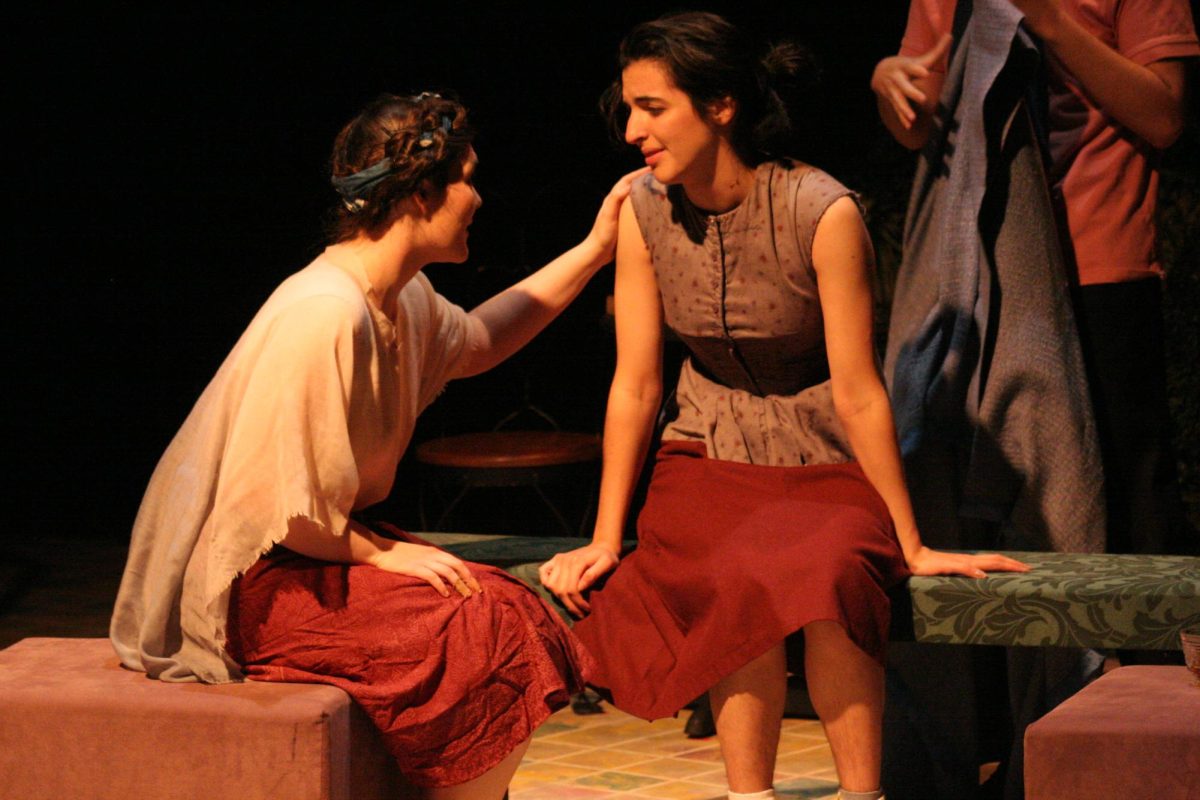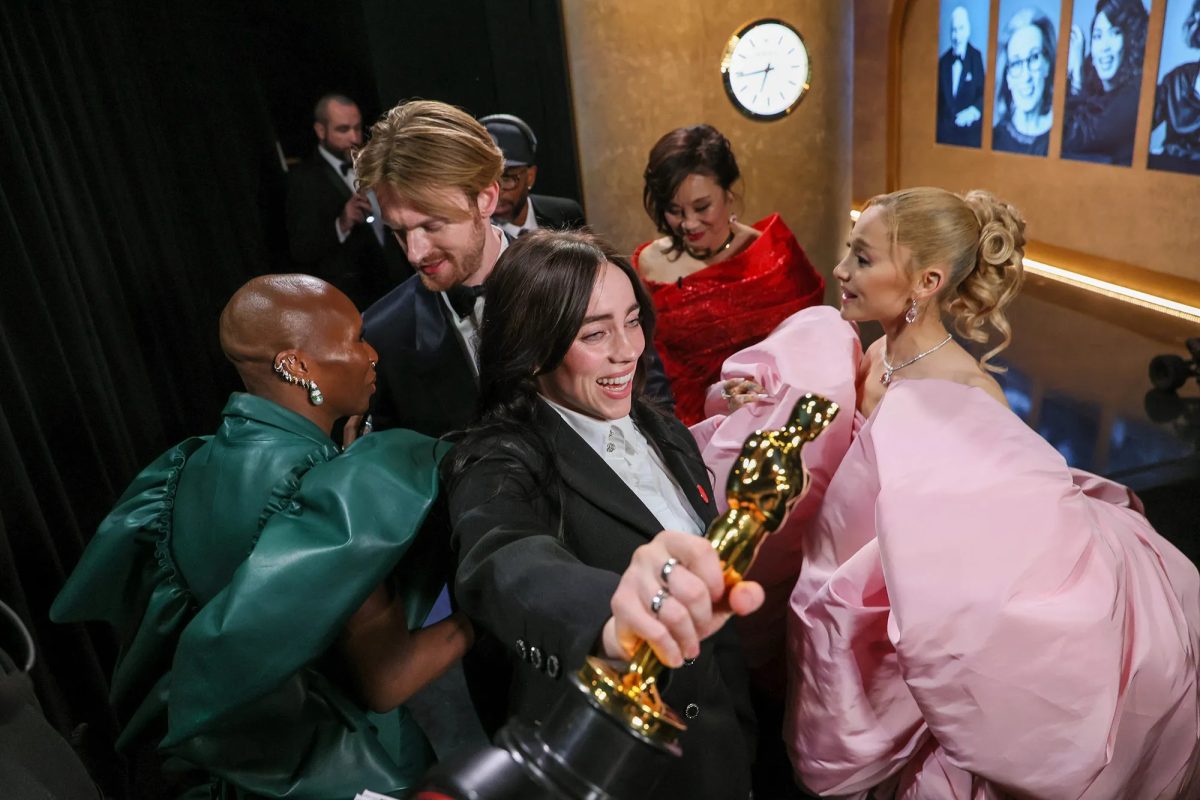April has been a month full of campus theater performances, between shows produced by the Oberlin Theatre Department, by student theater organizations like OMTA/OSTA, or independently produced. One of the first, but still most memorable, of these performances was Peerless, written by Jiehae Park and directed by College fourth-year Hana Castellano.
The play was not an easy watch. The script recontextualizes Shakespeare, setting Macbeth in a high school. However, Park uses this familiar plot archetype to make scathing commentary on race, affirmative action, and solidarity. The fast-paced dialogue preserves Shakespeare’s emphasis on language and rhythm while applying universal ideas of power and corruption to modern sensibilities. Instead of sparring for a predestined throne, the characters are competing for the “One Spot” left available at “The College,” which the central characters, twins M and L (after Macbeth and Lady Macbeth), have planned to attend for their entire lives. Not only does the text make effective commentary on the destructive powers of the exclusivity of PWIs on efforts for solidarity, but it does so while creating raw characters who engage with and challenge racial stereotypes.
It is clear that much love went into the creation of this production. Castellano explains what drew her to the text.
“I chose the show because it was super important to me to bring Asian-American theater to Oberlin,” Castellano said. “I felt it was very topical to talk about this issue of affirmative action when it had just been struck down by the Supreme Court. I know our campus isn’t diverse at all but I think that we should still do everything in our power to tell diverse stories, and I really wanted to focus Peerless’s message to be about the ways in which elite institutions like colleges will always fundamentally pit minorities against each other unless there is a total reevaluation of what it means to be an ‘elite college’.”
The cast and crew did wonders to bring this message to life. Everything from the lighting, to the hair, to the set — which abstracted a typical high school hallway — supported the show. The small cast was a powerhouse when it came to their performances. The result was a haunting, inescapable atmosphere that set the stage for a confrontational look at elitist institutions. This was aided by the knowledge of the tragic arc of the original Macbeth story, which becomes inexpressibly more heartbreaking when the characters are considerably more relatable than corrupted, age-old monarchs.
College third-year and lead actor Wren DiCello found empathy for their character.
“I was trained in very extreme acting, which I’ve learned to unlearn, being at college,” DiCello said. “It was like… you have to really get your hands dirty, and you have to feel what the character is feeling. Otherwise, you’re not in it. And that’s so stupid, because that’s not true. I think that I would prepare for [playing the role of M] by not fearing my character, because M is a lot like me, in very basic ways. Like, she and I are both very competitive or ambitious, and also very insecure. And also, she’s a kid. I’m not scared to play a 17-year-old kid. I was a 17-year-old kid. I think that the best way to play an intense character, a character that’s scary, is to love them. And to see where they’re coming from, and just empathize and play that.”
This point of empathy was especially important to College first-year Wesley Brubaker. He played the role of D, which serves as a variation on Shakespeare’s Duncan. D deals with mental health and body image struggles, a brother with serious health issues, and a recent revelation that he’s 1/16 Native American.
“That was definitely the part of the show I was most concerned about going in, because I was wondering if this was a role that made sense for me to play?” Brubaker said.
Not only does D hold an ethnic background that Brubaker doesn’t, but the play also features intentionally offensive costuming and malicious characters to expose the divisions imposed between marginalized peoples.
“I think a lot of what it is is coming at D from a place of understanding that he loves this community and that they were accepting of him, and that there are people who share similar experiences to that and they are valid in that, but that he’s also taking it from a wrong standpoint,” Brubaker said.
Castellano also recognized the importance of ethnicity in the show.
“I was really interested in the ways in which the twins are obviously very overt caricatures of Asian Americans — their sole purpose in life is to go to an elite college — and yet at the same time they have small moments that make them sympathetic,” Castellano said. “Their stereotypical nature is in service to the message I was trying to convey, which is that we do live in a culture that puts so much emphasis on going to the ‘right’ college that it creates this really toxic and harmful environment for high-schoolers, especially for minority students who feel this is the only way they can ever succeed.”
Partially due to the racial sensitivity of the show’s cast, there were a couple of times during the rehearsal process when the show didn’t have enough actors. Rehearsals started without an actor for the role of BF until College third-year Graham Evans stepped in about a week into rehearsals. Later, about a month out from performances, College first-year Angel Ma, originally cast as L, had to leave campus suddenly. After a few rehearsals in which the director played L, College first-year Luisa Wang stepped in at the last minute and played the role on book for the run of the show. The script in their hand, however, did not deter from their disquieting characterization and their teamwork with DiCello.
Despite various struggles, the production proved immersive, powerful, and clearly in line with Castellano’s message.
“The 2023 SCOTUS decision is just another way college has become increasingly inaccessible to students of color,” Castellano said. “In fact, the decision won’t do much for the Asian students it was supposed to “help” – it has been found that white students will continue to be favored when it comes to admission to elite colleges due to things like legacy admissions and geographical considerations, at the expense of Asian students as well as other racial minority students. Before this decision, affirmative action did help, but it also cultivated an environment of competition between different ethnic groups. So long as we treat some colleges as better than others and give them more money, it’s the poor and the racial minorities who have to fight it out for that ‘one spot.’”









